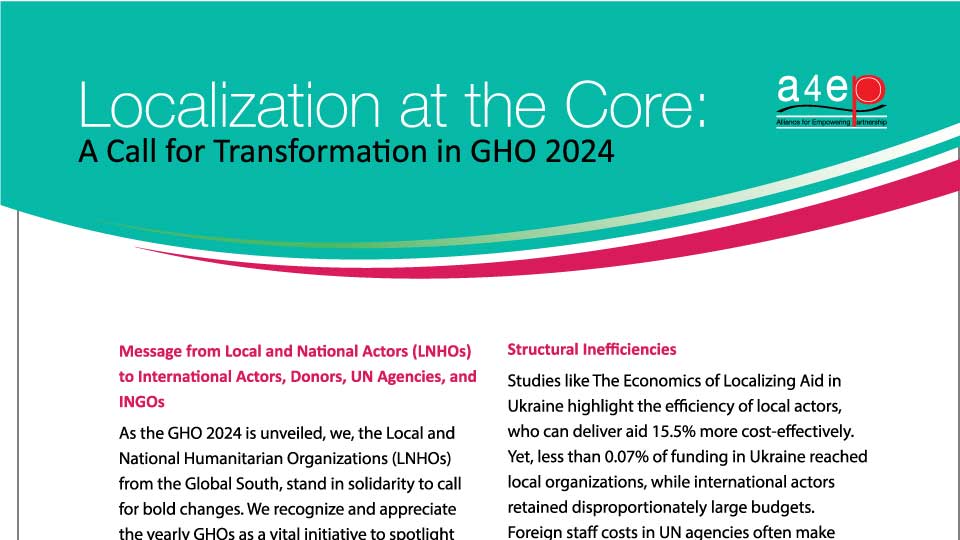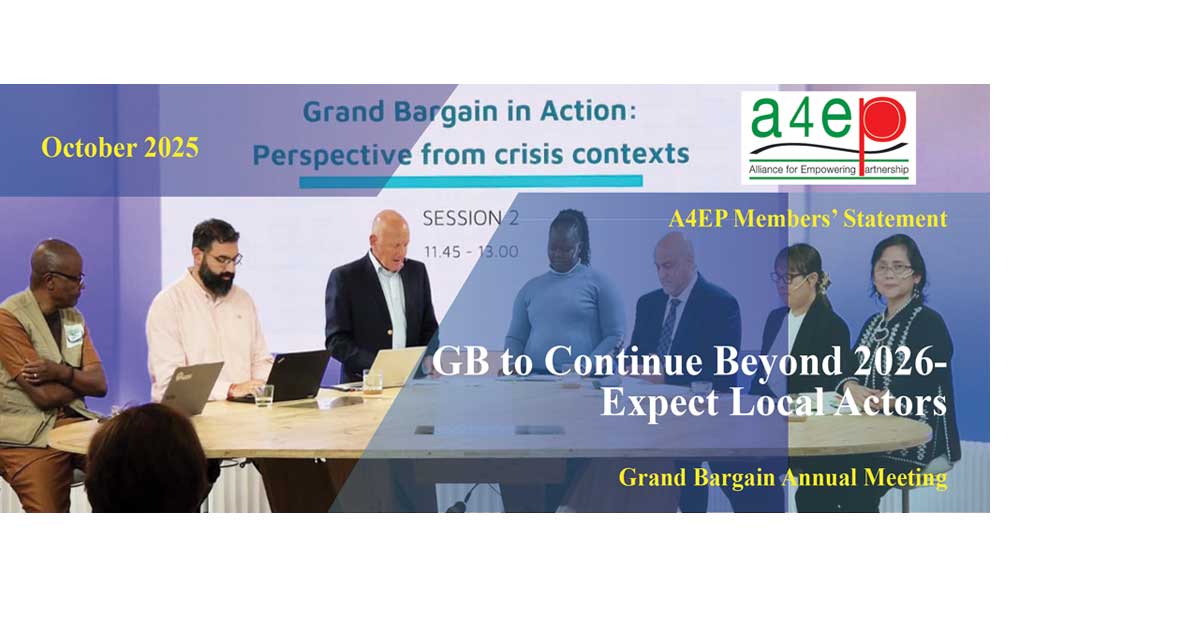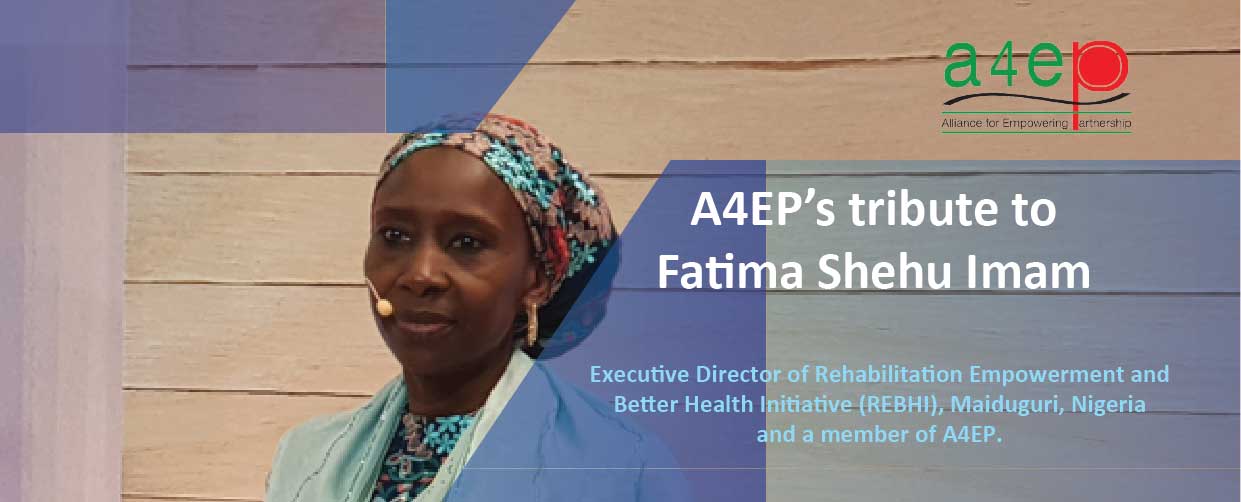Message from Local and National Actors (LNHOs) to International Actors, Donors, UN Agencies, and INGOs
As the GHO 2024 is unveiled, we, the Local and National Humanitarian Organizations (LNHOs) from the Global South, stand in solidarity to call for bold changes. We recognize and appreciate the yearly GHOs as a vital initiative to spotlight humanitarian needs, mobilize resources, and identify barriers to effective responses. However, as frontline actors, we voice our growing disillusionment. The global humanitarian system continues to sideline local actors, undermining equitable partnerships, ignoring the invaluable contributions of frontline workers, and failing to honor commitments such as the Grand Bargain of 2016.
Persistent Gaps in Funding and Partnerships
Despite repeated commitments to empower LNHOs, the stark realities tell a different story. The Falling Short? Humanitarian Funding and Reform report revealed that only 4.4% of humanitarian funding reaches local and national actors, and an even more negligible 0.6% is passed on directly.
Moreover, the rise in protracted crises funding—now 91% of interagency appeals in 2024 compared to 29% in 2014—underscores a critical failure: international funding mechanisms are perpetuating dependence rather than addressing root causes through durable solutions and a nexus approach.
Structural Inefficiencies
Studies like The Economics of Localizing Aid in Ukraine highlight the efficiency of local actors, who can deliver aid 15.5% more cost-effectively. Yet, less than 0.07% of funding in Ukraine reached local organizations, while international actors retained disproportionately large budgets. Foreign staff costs in UN agencies often make their budgets 17 times higher than local organizations’ budgets, further widening this inequity.
Neglect of Frontline Workers
Frontline workers—comprising 90% of the humanitarian workforce—are essential to crisis response, yet they remain undervalued, underpaid, and unprotected. This neglect not only undermines their dignity but also wastes the critical local knowledge and practices they bring.
Failing to recognize their capacities and support their contributions is a missed opportunity for more effective and sustainable responses. Investing in their safety, fair compensation, and professional development while integrating local practices is both a moral obligation and a strategic imperative to strengthen humanitarian outcomes.
Funding Trends Without Solutions
The GHO’s budgetary requirements have soared from $16.4 billion in 2015 to $49.06 billion in 2024. Yet, significant funding gaps persist, leaving millions underserved. Intermediaries like UN agencies and INGOs demand more funding but fail to reform their operational models to localize aid effectively or support the sustainability of local civil society structures.
Our Call to Action
We demand that the GHO 2024 and the international humanitarian system make localization a tangible priority:
- Mandatory Local Partnerships:
Donors working through intermediaries must mandate formal tripartite agreements that prioritize local and national organizations, ensuring resources and decision-making authority flow to those closest to the affected communities. - Transparent Funding:
Financial transparency must become a non-negotiable standard. All partnership agreements should include provisions to publish data on IATI or equivalent platforms, showing the flow of funds to local actors. - Flexible, Long-term Funding:
Local actors require flexible funding to design comprehensive, community-led solutions that address immediate needs while fostering long-term resilience and durable solutions. - Integrating Peacebuilding:
Funding for protracted crises must be linked to peacebuilding efforts. The cycle of recurrent crises cannot be broken without addressing their underlying political and social drivers. - Political Advocacy:
Donors must leverage their influence to advocate for adherence to International Humanitarian Law (IHL) and push for political solutions to end wars and conflicts. - Dignity for Frontline Workers:
Humanitarian response plans must include specific provisions to ensure the safety, fair compensation, and social security of frontline workers. Their contributions must be celebrated, not taken for granted.
Toward a Solution-Centric GHO
The GHO 2024 must move beyond perpetuating systemic inequities and power imbalances. It is time for the international humanitarian system to embrace a transformative agenda where local actors are no longer sidelined but empowered as equal partners. Localization is not just an ethical imperative; it is a pathway to a more effective, efficient, and just humanitarian response.
Let the GHO 2024 become a beacon for change—a call to action that places local actors and their communities at the heart of humanitarian efforts. Only then can we truly bridge the gap between needs and resources, ensuring dignity, equity, and resilience for all.
Contact: [email protected]




